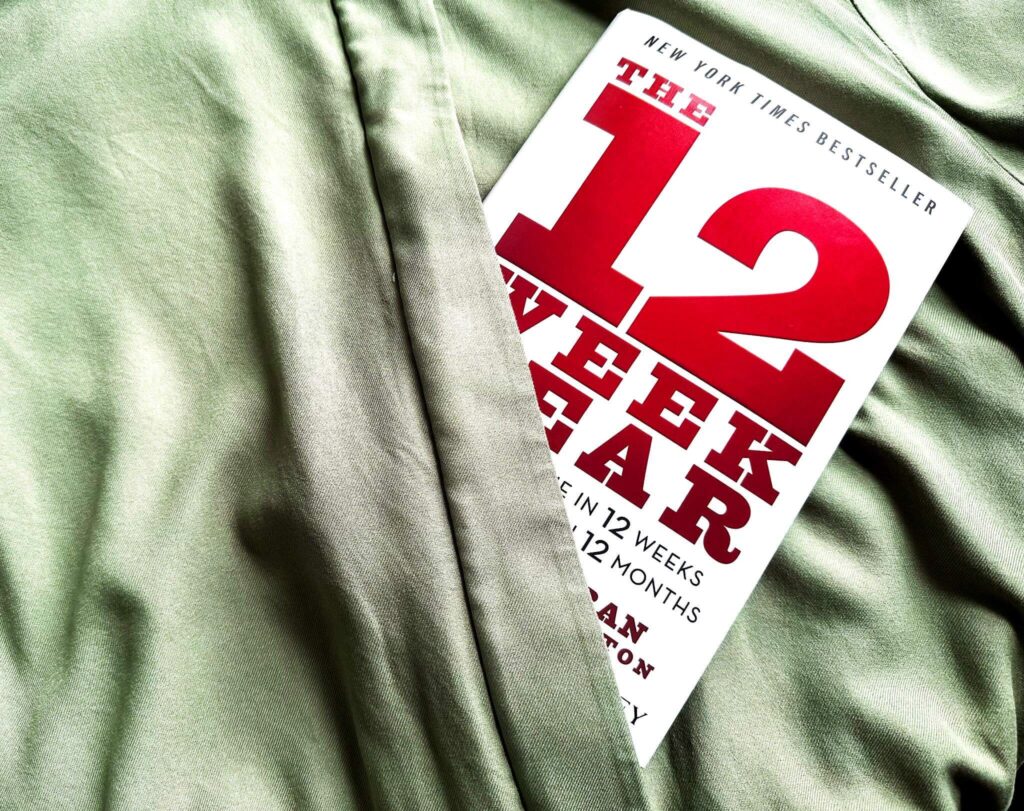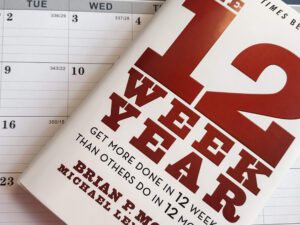The 12 Week Year by Brian P. Moran and Michael Lennington introduces an execution system that enables people to achieve more in less time. It challenges traditional annual planning and reshapes how we set and achieve our goals. Beyond its practical framework, the book is filled with valuable lessons on accountability, commitment, the value of time, and the cost of change. In this post, we explore those key takeaways to help unlock success.
1. Breakthroughs Start With A Vision That Pushes You
Breakthroughs don’t happen by chance; they require bold actions. The issue is that these actions are often uncomfortable, and our natural tendency is to choose comfort over discomfort. Unless we have a compelling reason to push through, the short-term discomfort of taking action often outweighs the long-term benefits of achieving our goals.
That’s why the first step in the 12 Week Year framework is to create and maintain a powerful vision. Before asking how to do something, we must first figure out why we want it. Without a vision we are deeply connected to, it’s easy to give up when things get tough.
However, many of us limit ourselves by setting small, “realistic” goals. This happens because when we imagine a future vastly different from our present, our amygdala—the part of our brain that protects us from danger—tries to shut it down. The good news is that our prefrontal cortex (PFC), the part of the brain responsible for planning and innovation, gets excited when we envision a greater future. Even better? We can train our brains by regularly thinking about our inspiring vision to make it feel more attainable over time.
To reach your full potential, you need a dream bigger than your current reality because only a bold and inspiring vision has the power to push you through fear, uncertainty, and discomfort to create a true breakthrough. As the authors suggest,
“To be most effective, your vision should make you feel uncomfortable and challenge you to do things differently—and do different things.”
Robert K. Greenleaf put it best:
“Behind every impossible achievement is a dreamer of impossible dreams.”
2. Every Change Requires Pain
Change is never easy. Whether you want to build a new habit, break an old one, or strive for a big goal, discomfort is inevitable. The greater your dreams and goals are, the more discomfort you must be willing to endure.
“The number-one thing that you will have to sacrifice to be great, to achieve what you are capable of, and to execute your plans, is your comfort.” – The 12 Week Year
Unfortunately, most people quit when things get tough because they associate discomfort with failure. In reality, discomfort is a sign of growth. The book reminds us that,
“The world requires that an effort be expended to accomplish great things,”
and progress requires pushing past resistance monsters—the barriers to change that stand between you and the life you want.
The key takeaway? If you are serious about achieving your goals, you need to reframe discomfort as part of the process instead of a reason to stop. The pain of change is temporary, but the regret of staying the same lasts much longer.
3. Multitasking Is Counterproductive
Have you ever tried to multitask and ended up failing at all the tasks? I have been there too.
In today’s fast-paced world, multitasking seems like the ultimate productivity hack. However, in reality, it does the opposite. It slows you down, reduces focus, and increases mistakes because our brains aren’t wired to handle multiple complex tasks simultaneously. As the book points out,
“When you mentally push back a primary task and pick up a new task, you increase the time needed to finish the primary task by 25 percent on average.”
Instead of trying to do everything at once, the book encourages single-tasking—giving your full attention to one important task at a time. To do this, you need to structure your day intentionally and dedicate focused time blocks to high-impact work. Deep work also requires learning to isolate yourself from distractions—smartphones, social media, and endless notifications—so you can make progress on what truly matters.
4. Accountability Is About Ownership, Not Blame
Many people blame external factors—their parents, boss, coworkers, school, or circumstances—for their failures. While this may provide temporary relief, in the long run, they pay a high price for losing control over their own lives.
Being accountable doesn’t mean beating yourself up or blaming others when you fail. Instead, it means acknowledging your role in outcomes, learning from mistakes, and using failures as valuable feedback on your journey to the life you deserve.
If you think about it, you always have choices regardless of the circumstances. For every dollar you earn, you choose to spend or save it. For every meal, you choose to eat healthy or junk food. For every valuable hour, you choose to scroll social media or work on important tasks that help you get closer to your goals. For every request from others, you choose to say “yes” or “no.”
“Understanding the quality of your choices determines the quality of your life.” – The 12 Week Year
To unlock success, you need to shift your mindset from external excuses to internal responsibility and spend your energy on the things you can control—your thinking and actions. One way to build greater accountability is to surround yourself with accountable people.
5. Excellence, Not Perfection, Drives Progress
I used to be a perfectionist. I would spend hours refining my plans, overanalyzing details, and even hesitating to take action if some small thing didn’t feel right. The result was I got more stressed and overwhelmed while making little to no progress. I didn’t realize that there is no such thing as a flawless plan or execution.
In The 12 Week Year, the authors emphasize striving for excellence instead of perfection. Excellence isn’t about getting everything right from the start; it’s about consistently showing up, giving your best effort, and making adjustments along the way.
For example, you don’t need to wait for the “perfect time” (like the next New Year) to start implementing the 12 Week Year system. You can begin right now, even after reading this blog post. Similarly, when you create your 12-week plan, don’t stress about making it perfect. As you execute, your weekly performance measurements will provide valuable feedback to help you refine your approach. The same goes for tracking your execution. If your score isn’t great at first, don’t get discouraged. See it as a chance to improve next week.
The people who wait for the perfect moment often never start, while those who take messy action keep moving forward. So, stop waiting. Get started and learn as you go. Excellence moves you forward, while perfection just holds you back.
6. Time Is Your Most Valuable Asset—Use It Wisely
Have you ever reached the end of the day wondering where all your time went? We often blame a lack of time for not achieving our goals, yet we unknowingly waste hours daily. According to The 12 Week Year,
“Time is the most squandered of all personal resources.”
Studies show that the average person wastes nearly two hours of every working day due to distractions and inefficiencies.
We live in an era filled with all the apps, tools, and hacks designed to save time and boost productivity, and we understand that our time is completely inelastic, but we still struggle to make the most of it. Why? Because knowing time is valuable isn’t enough; we must learn to use it intentionally.
Too often, we let our day run on autopilot. We jump from emails to meetings to whatever urgent request pops up without realizing that being busy is not the same as being productive. We burn through our time and energy on low-value tasks, leaving little room for the things that truly move us forward.
Here is the truth: everything worth achieving in life requires a commitment of time. So mastering intentional time use is one of the most valuable skills you can develop.
To take control of your day, you need to proactively schedule and structure your days and weeks around the high-impact activities that drive results. One of the best ways to do this is through time blocking. This means setting aside specific, uninterrupted time slots for your most important tasks so they don’t get lost in the chaos of the day. When you plan your time with intention, you get more done with less stress.
7. Keeping Your Promises Is A Core Discipline For Success
When people talk about success, they often focus on talent, intelligence, or hard work, but there is a crucial factor that’s rarely discussed. It’s follow-through.
The 12 Week Year looks at commitments on two levels: those you make to others and those you make to yourself. Every time you make a commitment to others and keep it, you build trust and strong relationships. Every time you do the same thing to yourself, you build discipline, self-confidence, and momentum. Without momentum, you will get stuck in the cycle of continually restarting. Waking up early, spending more time with your family, working on your goals consistently, and exercising regularly are a few examples of personal commitments.
Think about it: if you made a promise to your friend but repeatedly broke it, they would stop trusting you. The same thing happens internally. When you constantly break promises to yourself, you start doubting your ability to follow through, making it even harder to take action in the future. On the other hand, if you honor your commitments even when things get tough, you strengthen your ability to succeed in every area of life.
Of course, life happens, and we sometimes struggle to keep our promises. That’s why the book offers strategies for making successful commitments, including:
✔️ Identifying the costs before committing so that you don’t overpromise and underdeliver.
✔️Acting on your commitments, not your feelings, because interest wanes, but discipline sustains progress.
So, ask yourself: Are you keeping the promises you make? If not, start today. Commitment is what separates high achievers from those who stay stuck. Every time you follow through, you’re not just checking off a task, but also reinforcing the core discipline for success.
8. Greatness is Created in the Moment
In my family, there’s a rule no one dares to break: no cell phones during weekend meals. And you know what? I often forget what I ate during the week, but I almost always remember what my family had last weekend.
In today’s fast-paced world, many of us are constantly rushing. Our schedules are packed; our minds are scattered, and our attention is divided. We hustle through the day, trying to check off as many tasks as possible. However, as The 12 Week Year points out,
“In our efforts to not miss anything, we unwittingly miss everything.”
We’re busy, but not truly productive. We go to bed exhausted yet feel like we didn’t accomplish much.
To be effective, you need to be fully present both mentally and physically. When you focus on a single task, your brain is clearer, and you produce higher-quality results. Being in the moment also means letting go of the past and not obsessing over the future because the past is over, while the future is not something you wait for, but something you create.
The actions you take right now shape your future. So, embrace every moment as an opportunity to move you forward. When you show up fully engaged, you’re building the foundation for greatness. Moran and Lennington put it well,
“You become great long before the results show it. It happens in an instant, the moment you choose to do the things you need to do to be great.”
9. Life Balance Is About Intentional Imbalance
When people talk about life balance, they often imagine a perfect division of time and energy across all areas of life, including work, family, community, health, and personal growth. The 12 Week Year makes it clear that it’s not the kind of balance you should aim for. Instead, real balance is about being intentionally imbalanced.
Instead of trying to do everything equally, you choose one or two areas to focus on for a short period. That doesn’t mean you are neglecting everything else. It just means that you are being intentional about where your energy goes because stretching yourself too thin leads to frustration and minimal progress.
For example, if you’re starting a new job, your career might take center stage for a while. If you’re prioritizing your health, then you might dedicate extra time to exercise and meal preparation. The key is you make these choices consciously rather than letting life pull you in every direction. After a focused period, like a 12-week cycle, you reassess and shift your priorities as needed.
So ask yourself:
- What matters most to me right now?
- What can I ease up on for a while?
Your answers will help you give the right things the right attention at the right time.
Final Thoughts
The nine lessons we’ve covered show that success isn’t about working harder; it’s about having the courage to dream big, using time wisely, taking ownership of our actions, keeping our promises, and staying consistent and intentional. Whether you’re an entrepreneur, professional, or someone striving for personal growth, implementing the 12 Week Year principles can help you unlock success in less time.
Now, I’d love to hear from you:
📌 What’s one goal you’ve been putting off that you want to tackle using the 12 Week Year system?
📌 Which lesson resonated the most with you?
Let me know in the comments below!
If you haven’t read the book yet, check out my detailed review to see if it’s the right read for you.





